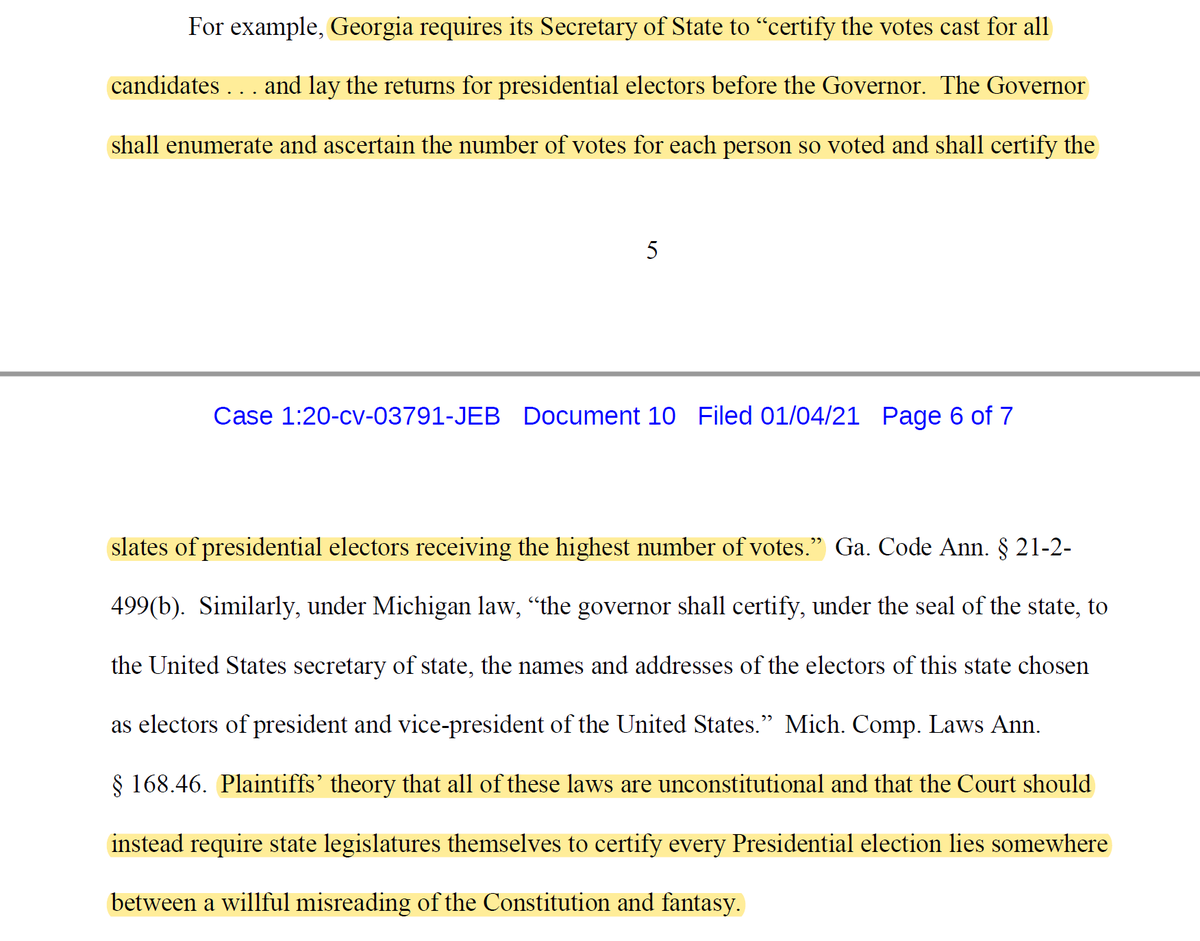
Election Litigation Update: DC - the "let's sue the Electoral College" case.
This is a bit surprising, given that as of last time I checked nobody had been served and no appearance had been entered. I suspect it's an effort to make sure the case isn't "pending" on the 6th.
Link: https://t.co/oOJZD1F4x2
— Brad Heath (@bradheath) January 4, 2021


If I was plaintiffs counsel, I'd definitely be clearing under my desk right now, and possibly also my underwear.
Judge calling out the length of your filing by both page count and number of footnotes is very much the same energy as your mother using your full name, middle name included, at you. At volume.





Honestly, I don't know. They can, of course, run to the DC Circuit right now if they want - denial of injunctive relief is immediately appealable.
But that would be EXCEPTIONALLY stupid.
More from Mike Dunford
This is an excellent question, and it's something that I've thought about some over the last couple of months.
Honestly, I think the answer is that the rationales for these rulings are not likely to unreasonably harm meritorious progressive OR conservative challenges.
The first thing to keep in mind is that, by design, challenges to the outcomes of elections are supposed to be heard by state courts, through the process set out in state law.
That happened this year, and the majority of those challenges were heard on the merits.
The couple of cases where laches determined the outcome of state election challenges were ones where it was pretty clear that the challenges were brought in bad faith - where ballots cast in good faith in reliance on laws that had been in force for some time were challenged.
The PA challenge to Act 77 is one example. The challengers, some of whom had voted for passage of the bill, didn't make use of the initial, direct-to-PA-SCt challenge built into the law or sue pre-election; they waited until post-election.
The WI case is another. That one had a challenge to ballots cast using a form that had been in use for a literal decade.
Those are cases where laches is clear - particularly the prejudice element.
Honestly, I think the answer is that the rationales for these rulings are not likely to unreasonably harm meritorious progressive OR conservative challenges.
Any merit to the notion that the rationales for some of these rulings will harm progressive challenges in future elections?
— Andrew Broering (@AndrewBroering) January 3, 2021
One says laches, another moot, another standing, sometimes with almost the same type of plaintiff.
The first thing to keep in mind is that, by design, challenges to the outcomes of elections are supposed to be heard by state courts, through the process set out in state law.
That happened this year, and the majority of those challenges were heard on the merits.
The couple of cases where laches determined the outcome of state election challenges were ones where it was pretty clear that the challenges were brought in bad faith - where ballots cast in good faith in reliance on laws that had been in force for some time were challenged.
The PA challenge to Act 77 is one example. The challengers, some of whom had voted for passage of the bill, didn't make use of the initial, direct-to-PA-SCt challenge built into the law or sue pre-election; they waited until post-election.
The WI case is another. That one had a challenge to ballots cast using a form that had been in use for a literal decade.
Those are cases where laches is clear - particularly the prejudice element.
OK. The Teams meeting that I unsuccessfully evaded (and which was actually a lot of fun and I'm really genuinely happy I was reminded to attend) is over, so let's take another swing at looking at the latest filings from in re Gondor.
As far as I can tell from the docket, this is the FOURTH attempt in a week to get a TRO; the question the judge will ask if they ever figure out how to get the judge's attention will be "couldn't you have served by now;" and this whole thing is a
The memorandum in support of this one is 9 pages, and should go pretty quick.
But they still haven't figured out widow/orphan issues.
https://t.co/l7EDatDudy

It appears that the opening of this particular filing is going to proceed on the theme of "we are big mad at @SollenbergerRC" which is totally something relevant when you are asking a District Court to temporarily annihilate the US Government on an ex parte basis.

Also, if they didn't want their case to be known as "in re Gondor" they really shouldn't have gone with the (non-literary) "Gondor has no king" quote.

Oh myyyyyyyyyy
— Mike Dunford (@questauthority) January 25, 2021
Good morning, followers of frivolous election-related litigation - new filings in Seditionists v 117th Congress et al. (aka in re Gondor)
I've really got to get stuff done, but there's time for a really quick overview.
As far as I can tell from the docket, this is the FOURTH attempt in a week to get a TRO; the question the judge will ask if they ever figure out how to get the judge's attention will be "couldn't you have served by now;" and this whole thing is a
The memorandum in support of this one is 9 pages, and should go pretty quick.
But they still haven't figured out widow/orphan issues.
https://t.co/l7EDatDudy

It appears that the opening of this particular filing is going to proceed on the theme of "we are big mad at @SollenbergerRC" which is totally something relevant when you are asking a District Court to temporarily annihilate the US Government on an ex parte basis.

Also, if they didn't want their case to be known as "in re Gondor" they really shouldn't have gone with the (non-literary) "Gondor has no king" quote.

More from Politics
You May Also Like
1/“What would need to be true for you to….X”
Why is this the most powerful question you can ask when attempting to reach an agreement with another human being or organization?
A thread, co-written by @deanmbrody:
2/ First, “X” could be lots of things. Examples: What would need to be true for you to
- “Feel it's in our best interest for me to be CMO"
- “Feel that we’re in a good place as a company”
- “Feel that we’re on the same page”
- “Feel that we both got what we wanted from this deal
3/ Normally, we aren’t that direct. Example from startup/VC land:
Founders leave VC meetings thinking that every VC will invest, but they rarely do.
Worse over, the founders don’t know what they need to do in order to be fundable.
4/ So why should you ask the magic Q?
To get clarity.
You want to know where you stand, and what it takes to get what you want in a way that also gets them what they want.
It also holds them (mentally) accountable once the thing they need becomes true.
5/ Staying in the context of soliciting investors, the question is “what would need to be true for you to want to invest (or partner with us on this journey, etc)?”
Multiple responses to this question are likely to deliver a positive result.
Why is this the most powerful question you can ask when attempting to reach an agreement with another human being or organization?
A thread, co-written by @deanmbrody:
Next level tactic when closing a sale, candidate, or investment:
— Erik Torenberg (@eriktorenberg) February 27, 2018
Ask: \u201cWhat needs to be true for you to be all in?\u201d
You'll usually get an explicit answer that you might not get otherwise. It also holds them accountable once the thing they need becomes true.
2/ First, “X” could be lots of things. Examples: What would need to be true for you to
- “Feel it's in our best interest for me to be CMO"
- “Feel that we’re in a good place as a company”
- “Feel that we’re on the same page”
- “Feel that we both got what we wanted from this deal
3/ Normally, we aren’t that direct. Example from startup/VC land:
Founders leave VC meetings thinking that every VC will invest, but they rarely do.
Worse over, the founders don’t know what they need to do in order to be fundable.
4/ So why should you ask the magic Q?
To get clarity.
You want to know where you stand, and what it takes to get what you want in a way that also gets them what they want.
It also holds them (mentally) accountable once the thing they need becomes true.
5/ Staying in the context of soliciting investors, the question is “what would need to be true for you to want to invest (or partner with us on this journey, etc)?”
Multiple responses to this question are likely to deliver a positive result.



























